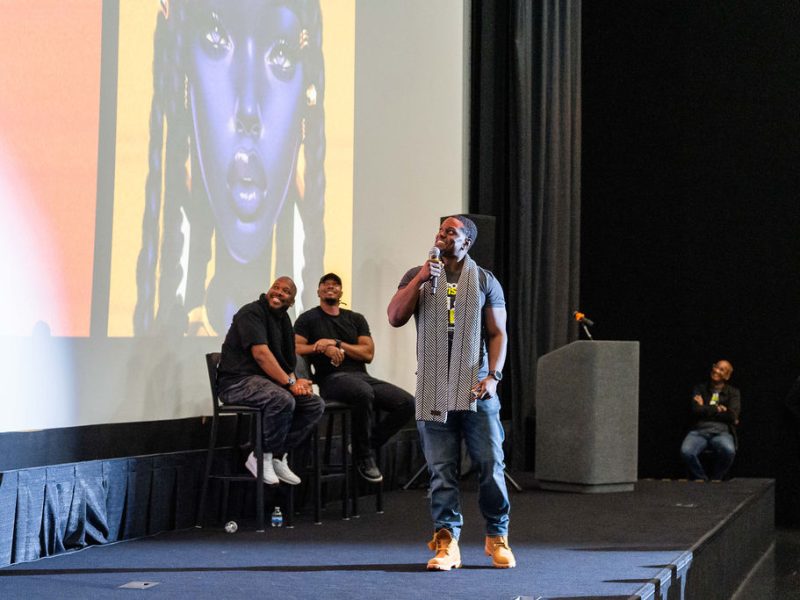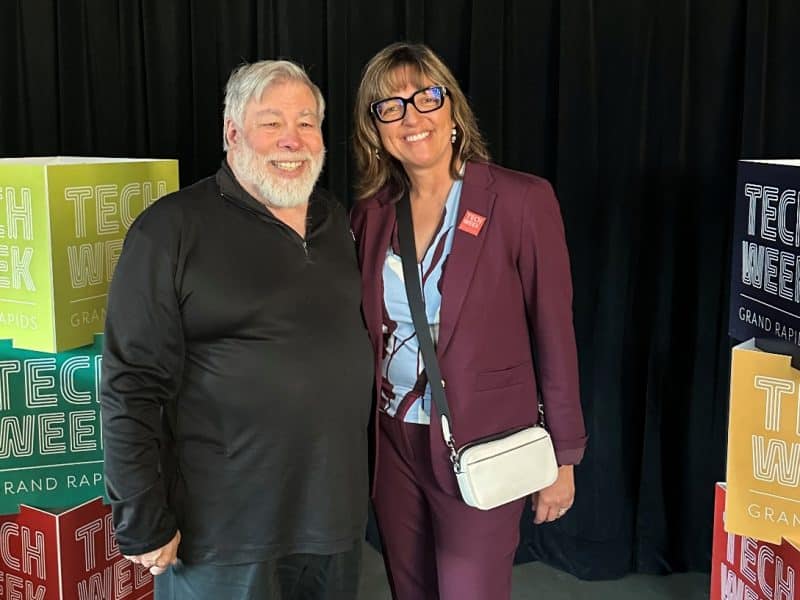Gateway to creation: GR’s Maker Movement gives space & tools to bring inventors’ ideas to life
For independent inventors, it can be difficult accessing the necessary space and tools to make their ideas become a reality. Here in Grand Rapids, however, older and newer groups alike are providing 'makerspaces' for these individuals throughout the city, and GR is increasingly proving to be fertile ground for our city's inventors, designers and tinkerers.
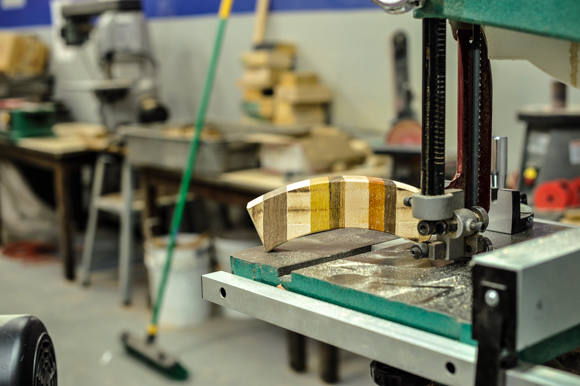
Tinkers, makers, hackers. Though they go by many names, those with a passion for creating with their hands and minds have much in common and fall under the umbrella of what’s known across the country as the “Maker Movement.” Much like the shared economy, makers offer their talents, skills and knowledge to enable each other to get their projects off the ground. Often working in group “maker spaces” (essentially, common physical spaces that offer people technological tools and a venue to collaboratively, and individually, work on their projects) , makers enjoy working together toward common and individual goals, forming micro-communities and learning from each other.
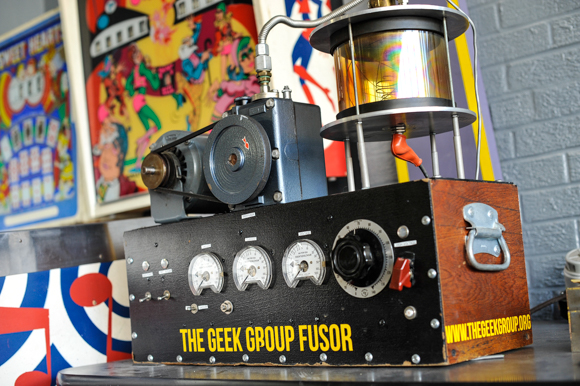
Here in Grand Rapids, the Maker Movement is increasing in popularity, offering those with the time and energy a space in which to explore their passions. With decades-old models like the Geek Group, younger groups like GR Makers and future companies like TechShop creating their own unique makerspaces throughout the city, GR is proving fertile ground for these independent inventors.
AdWeek and Time Magazine have covered the Maker Movement and its influence on innovation. In its piece, AdWeek provides a helpful description defining the movement:
“The maker movement, as we know, is the umbrella term for independent inventors, designers and tinkerers. A convergence of computer hackers and traditional artisans, the niche is established enough to have its own magazine, Make, as well as hands-on Maker Faires that are catnip for DIYers who used to toil in solitude. Makers tap into an American admiration for self-reliance and combine that with open-source learning, contemporary design and powerful personal technology like 3-D printers. The creations, born in cluttered local workshops and bedroom offices, stir the imaginations of consumers numbed by generic, mass-produced, made-in-China merchandise.”
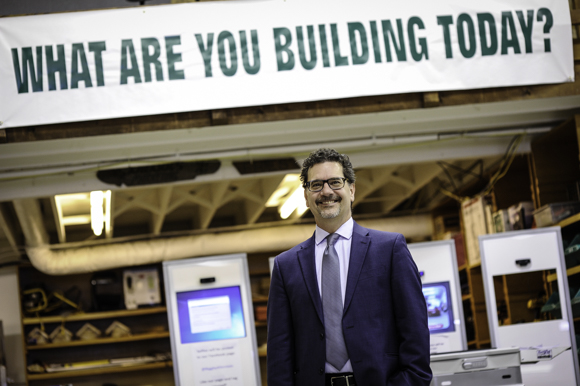
This “toil in solitude” idea is exactly what Casey DuBois, founder and former head of GR Makers, sought to avoid when first creating his makerspace. “I started GR Makers in my garage,” says DuBois, who in 2012, began hosting weekly meetings that were open to anyone interested in working on projects that required technology and tools to which they did not have access. “We’d all stay up and hack away on things,” says DuBois.
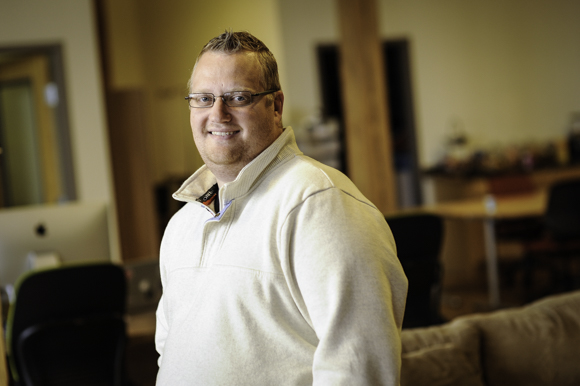
Starting out with eight to 15 people every Wednesday, GR Makers grew to more than 70 people within 10 months. “That was a little bit much for me to support,” says DuBois. Partnering with software development company Mutually Human in April 2013, DuBois joined forces with the company’s founder and president, Mark Van Holstyn, to develop the GR Makers space with the company. Setting up shop at 401 Hall St., Mutually Human acquired a 3,200-square-foot outdoor space and added another 5,000-square-foot indoor space, to total just under 9,000 square feet.
How did GR Makers grow so quickly? “The makerspace is all about helping each other and moving your projects forward,” says DuBois. This community-oriented space attracts all types, from quilters to code writers, from designers to builders.
In addition to camaraderie, makerspaces also enable designers and creators to think differently when working alongside those with different skill sets. Take Mutually Human, for example, a 10-year old software company that has adapted to software becoming a part of our physical world through the “Internet of Things,” the idea that everyday objects connect to the internet. “Software has started to creep into every other object. Every physical device,” says Holstyn. “It can be all kinds of places,” like refrigerators, thermostats and lighting systems. Thus, Mutually Human initially sought out GR Makers “to deepen our knowledge and our skills,” he says.
This pursuit of wider knowledge is exactly why some larger companies have sought out time at makerspaces for their employees. At GR Makers, DuBois hosted Michigan Industrial Tools, which sponsored the group financially and with tools, and then sent their employees to utilize the space. For one project, employees were designing a new screwdriver and were able to print it out on Makers’ 3D printer in order to hold in their hand a physical object before it went into production.
Other such examples include TechShop’s partnership with Ford employees at their Detroit location, in which Ford workers can use the makerspace at their leisure in order to enhance their creative contributions to the company. These relationships with makerspaces afford even large, corporate entities to explore creative possibilities outside of their day-to-day operations.
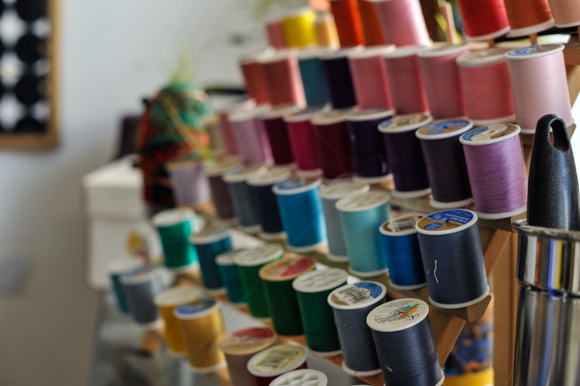
Makerspaces also often host school and community groups, allowing children and adults to explore technology in a hands-on setting. At the Geek Group on the West Side, founder Chris Boden welcomes nonprofit groups to host educational meetings for free. His roster includes the Muskegon Model Rocketry Group and a sewing group, and has formerly included the Grand River Wood Turners Guild. “If it’s educational, we’re there,” says Boden. GR Makers also welcomes school groups to use its facilities. “It’s a great way to introduce kids to robotics,” says DuBois.
While some enjoy simply working alongside others for the camaraderie and the chance to increase their skill sets, others utilize makerspaces for the opportunity to access the technology needed to get their projects and businesses off the ground. Technology like 3D printers, that would otherwise be inaccessible to individuals with no capital, can usually be utilized for a reasonable monthly fee. And, the organizers of the makerspaces will train you on how to safely use the equipment. With this access and community support, entrepreneurs are afforded the rare opportunity to learn the skills necessary to define their project with computer coding, or even create a prototype. And, often, those prototypes turn into actual products that hit the market. From cell phone cases to construction tools, the tinkering that goes on in these spaces isn’t just experimental. One of these tools, The Foam Buddy, created by GR Maker Gary Hammerlund and funded by StartGarden, is a weatherization tool currently being used by customers, and Hammerlund is working on growing his customer base.
With many businesses getting off the ground with GR makerspaces and a strong design and manufacturing community, international makerspace company TechShop has also decided that the West Michigan community is a great option for a new location.
“In Grand Rapids, we believe that the potential TechShop location will be viewed more as a community asset accessed by a wide-range of organizations, makers and artists,” says TechShop Chief Executive Officer Dan Woods. “At TechShop, we believe every community deserves a makerspace. And most need several. We are thrilled be conducting this market assessment to explore the concept of bring a TechShop to Grand Rapids.”
The Grand Rapids-based Start Garden has partnered with the company to conduct a feasibility study, which is set to conclude in early 2017. News covering the development has noted that TechShop is narrowing in on the West Side for its GR location.
Despite the size of TechShop, Start Garden’s Brian Burch, who’s handling TechShop’s media efforts in the area, notes that their makerspaces continue to be neighborhood-driven. This type of welcoming atmosphere gives everyone a chance to walk through their doors and give their equipment and technology a try. TechShop expects to draw a diverse crowd to its Grand Rapids locale by supporting everyone from teenagers to the working class, from designers to contractors, from hobbyists to retirees.
With older models and new, kids and kids-at-heart, makerspaces are enabling creators of all stripes to test their projects with the right tools at their fingertips. Working together, sharing their knowledge, broadening their skill sets, and getting to use some pretty cool technology, makers in Grand Rapids and across the globe are on the cusp of a movement that is sure to make a dent in the sharing economy.
“Just go out there and invent and make and share your knowledge,” says DuBois. “It’s changed my life.”
“Making It In Grand Rapids” is a series about local entrepreneurs and the issues that matter in building a sustainable, startup-friendly community. Support for this series is provided by Start Garden. You can reach the editor of this series, Allison Spooner, on Twitter or e-mail her at alspooner@gmail.com for story tips and feedback.

